史上最全的中考英语必考知识点大全.
- 格式:pdf
- 大小:91.00 KB
- 文档页数:54
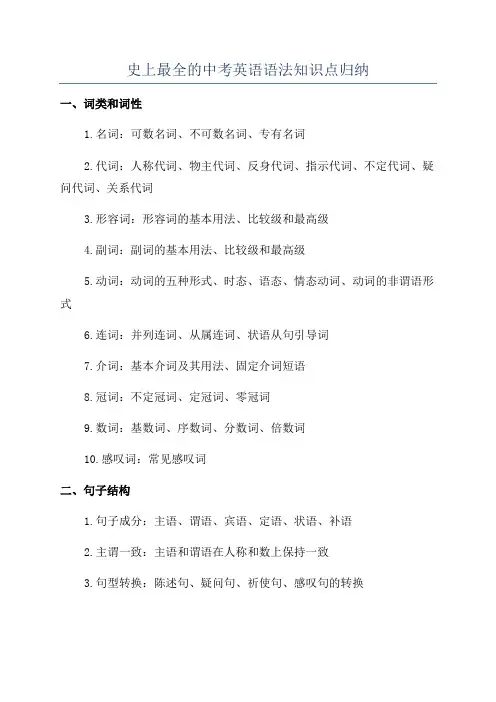
史上最全的中考英语语法知识点归纳一、词类和词性1.名词:可数名词、不可数名词、专有名词2.代词:人称代词、物主代词、反身代词、指示代词、不定代词、疑问代词、关系代词3.形容词:形容词的基本用法、比较级和最高级4.副词:副词的基本用法、比较级和最高级5.动词:动词的五种形式、时态、语态、情态动词、动词的非谓语形式6.连词:并列连词、从属连词、状语从句引导词7.介词:基本介词及其用法、固定介词短语8.冠词:不定冠词、定冠词、零冠词9.数词:基数词、序数词、分数词、倍数词10.感叹词:常见感叹词二、句子结构1.句子成分:主语、谓语、宾语、定语、状语、补语2.主谓一致:主语和谓语在人称和数上保持一致3.句型转换:陈述句、疑问句、祈使句、感叹句的转换4.句子的简单句、并列句、复合句、复合句类型(定语从句、状语从句、宾语从句)三、时态和语态1.一般现在时2.一般过去时3.现在进行时4.过去进行时5.一般将来时6.一般过去将来时7.现在完成时8.过去完成时9.现在完成进行时10.一般过去完成进行时11.被动语态四、非谓语动词1.不定式2.动名词3.动词-ing形式五、虚拟语气1.与事实相反的虚拟语气:与现在事实相反的虚拟语气、与过去事实相反的虚拟语气2.与将来事实相反的虚拟语气3.与现在条件相反的虚拟语气4.与过去条件相反的虚拟语气六、定语从句1.关系代词引导的定语从句2.关系副词引导的定语从句3.定语从句的嵌套七、状语从句1.时间状语从句2.地点状语从句3.方式状语从句4.原因状语从句5.条件状语从句6.比较状语从句7.目的状语从句8.结果状语从句八、宾语从句1.宾语从句的引导词2.宾语从句的位置九、名词性从句1.主语从句2.宾语从句3.表语从句十、情态动词1.can和could2.may和might3.will和would4.shall和should5.must和have to6.need和dare以上是中考英语语法知识点的简要归纳,更详细的内容需要根据课本和学习资料进行学习和理解。

史上最全的中考英语语法必考知识点大全
一、时态
1.一般现在时:叙述现在地基本情况及习惯性动作,主动形式表示现在状态或现在客观存在的事实。
2.一般过去时:表示过去其中一时间发生的动作和存在的状态。
3.现在完成时:表示从过去其中一时间开始,一直延续到现在的动作或状态。
4.现在进行时:表示此刻正在发生的动作或存在的状态。
5.一般将来时:表示将来其中一时刻或其中一段时间内发生的动作或存在的状态。
6.过去将来时:表示过去时预计或计划将来要发生的动作或存在的状态。
7.状语从句中的时态:
(1)主句是一般现在时,从句一般用一般现在时;
(2)主句是一般过去时,从句一般用一般过去时;
(3)主句是一般将来时,从句一般用一般将来时;
(4)主句是现在完成时,从句一般用过去将来时。
二、句法结构
1.主谓一致:谓语动词表达的动作所发生的时间和主语之间是一致的关系。
2.主语从句:即用疑问词引导的从句,其主语在句中充当整个句子或者句子成分的主语。
3.主谓宾:即主语、谓语动词和宾语三部分的句子结构。
4.定语从句:即用关联词引导的附加句,其作用是对主句中的一些名词或代词进行补充说明。
5.宾语从句:即用从属连词引导的从句,其作用是把从句的内容作为宾语放在动词后面。
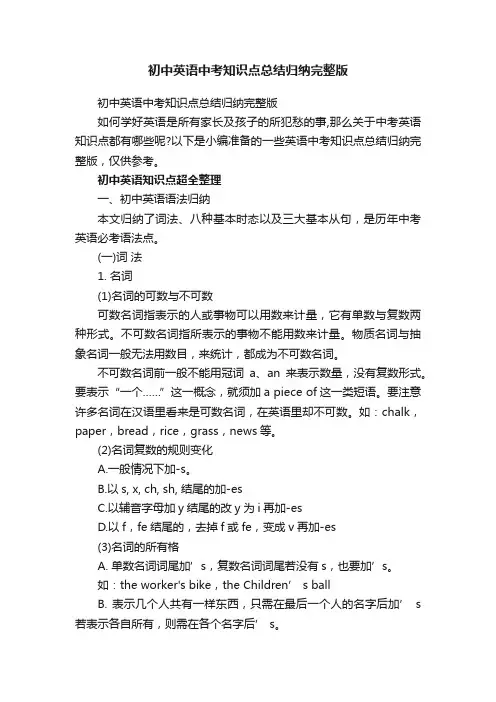
初中英语中考知识点总结归纳完整版初中英语中考知识点总结归纳完整版如何学好英语是所有家长及孩子的所犯愁的事,那么关于中考英语知识点都有哪些呢?以下是小编准备的一些英语中考知识点总结归纳完整版,仅供参考。
初中英语知识点超全整理一、初中英语语法归纳本文归纳了词法、八种基本时态以及三大基本从句,是历年中考英语必考语法点。
(一)词法1. 名词(1)名词的可数与不可数可数名词指表示的人或事物可以用数来计量,它有单数与复数两种形式。
不可数名词指所表示的事物不能用数来计量。
物质名词与抽象名词一般无法用数目,来统计,都成为不可数名词。
不可数名词前一般不能用冠词a、an来表示数量,没有复数形式。
要表示“一个……”这一概念,就须加a piece of这一类短语。
要注意许多名词在汉语里看来是可数名词,在英语里却不可数。
如:chalk,paper,bread,rice,grass,news等。
(2)名词复数的规则变化A.一般情况下加-s。
B.以s, x, ch, sh, 结尾的加-esC.以辅音字母加y结尾的改y为i再加-esD.以f,fe结尾的,去掉f或fe,变成v再加-es(3)名词的所有格A. 单数名词词尾加’s,复数名词词尾若没有s,也要加’s。
如:the worker's bike,the Children’ s ballB. 表示几个人共有一样东西,只需在最后一个人的名字后加’ s 若表示各自所有,则需在各个名字后’ s。
如:This is Lucy and Licy’ s room.These are Kate's and jack’ s rooms.C. 如果是通过在词尾加—s构成的复数形式的名词,只加’。
如:the students’ books,the girls’ blouses(另外:名词+of+名词名词是有生命的,我们就用’s结构来表示所有关系。
如果名词所表示的事物是无生命的,我们就要用名词+of+名词的结构来表示所有关系。
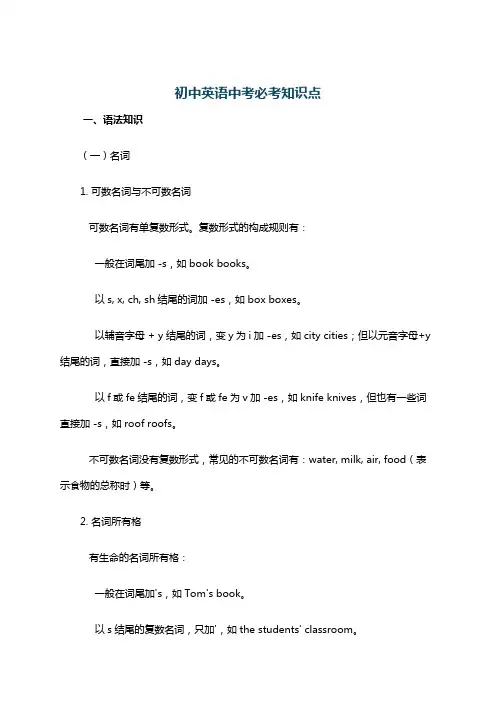
初中英语中考必考知识点一、语法知识(一)名词1. 可数名词与不可数名词可数名词有单复数形式。
复数形式的构成规则有:一般在词尾加 -s,如book books。
以s, x, ch, sh结尾的词加 -es,如box boxes。
以辅音字母 + y结尾的词,变y为i加 -es,如city cities;但以元音字母+y 结尾的词,直接加 -s,如day days。
以f或fe结尾的词,变f或fe为v加 -es,如knife knives,但也有一些词直接加 -s,如roof roofs。
不可数名词没有复数形式,常见的不可数名词有:water, milk, air, food(表示食物的总称时)等。
2. 名词所有格有生命的名词所有格:一般在词尾加's,如Tom's book。
以s结尾的复数名词,只加',如the students' classroom。
表示两者或两者以上共同拥有时,只在最后一个名词后加's;表示各自拥有时,每个名词后都加's。
例如:Lucy and Lily's mother(她们共同的妈妈);Lucy's and Lily's rooms(她们各自的房间)。
无生命的名词所有格常用“of + 名词”结构,如the window of the room。
(二)代词1. 人称代词主格:I, you, he, she, it, we, you, they,在句中作主语。
例如:I like English.宾格:me, you, him, her, it, us, you, them,在句中作宾语。
例如:He helps me.2. 物主代词形容词性物主代词:my, your, his, her, its, our, your, their,后面要接名词。
例如:This is my book.名词性物主代词:mine, yours, his, hers, its, ours, yours, theirs,相当于“形容词性物主代词+名词”。
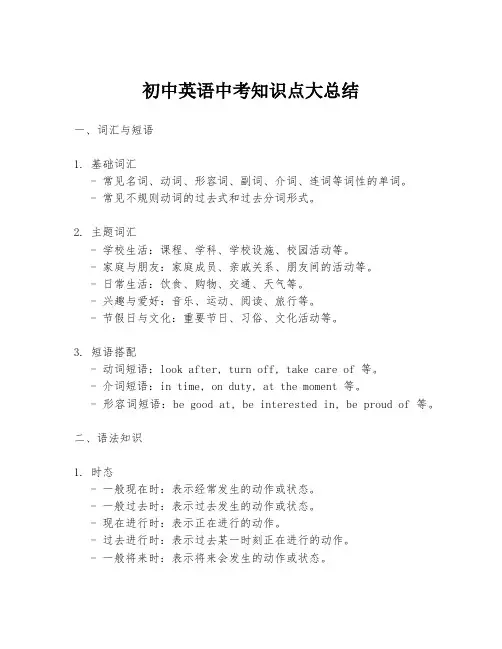
初中英语中考知识点大总结一、词汇与短语1. 基础词汇- 常见名词、动词、形容词、副词、介词、连词等词性的单词。
- 常见不规则动词的过去式和过去分词形式。
2. 主题词汇- 学校生活:课程、学科、学校设施、校园活动等。
- 家庭与朋友:家庭成员、亲戚关系、朋友间的活动等。
- 日常生活:饮食、购物、交通、天气等。
- 兴趣与爱好:音乐、运动、阅读、旅行等。
- 节假日与文化:重要节日、习俗、文化活动等。
3. 短语搭配- 动词短语:look after, turn off, take care of 等。
- 介词短语:in time, on duty, at the moment 等。
- 形容词短语:be good at, be interested in, be proud of 等。
二、语法知识1. 时态- 一般现在时:表示经常发生的动作或状态。
- 一般过去时:表示过去发生的动作或状态。
- 现在进行时:表示正在进行的动作。
- 过去进行时:表示过去某一时刻正在进行的动作。
- 一般将来时:表示将来会发生的动作或状态。
2. 语态- 被动语态:表示动作的承受者。
- 常见时态的被动语态形式。
3. 非谓语动词- 动名词:作为名词使用,表示动作。
- 分词:现在分词和过去分词,用作形容词或副词。
- 不定式:作为名词、形容词、副词等。
4. 情态动词- can/could, may/might, must, should/ought to 等。
- 表示可能性、建议、义务等。
5. 代词- 人称代词、物主代词、反身代词、指示代词、疑问代词等。
6. 连词- 并列连词:and, but, or, so 等。
- 从属连词:because, since, although, if, when 等。
7. 句子结构- 简单句、复合句、复杂句。
- 陈述句、疑问句、祈使句、感叹句。
8. 特殊句式- 倒装句:表示强调或条件。
- 省略句:在某些情况下可以省略句子的某些成分。
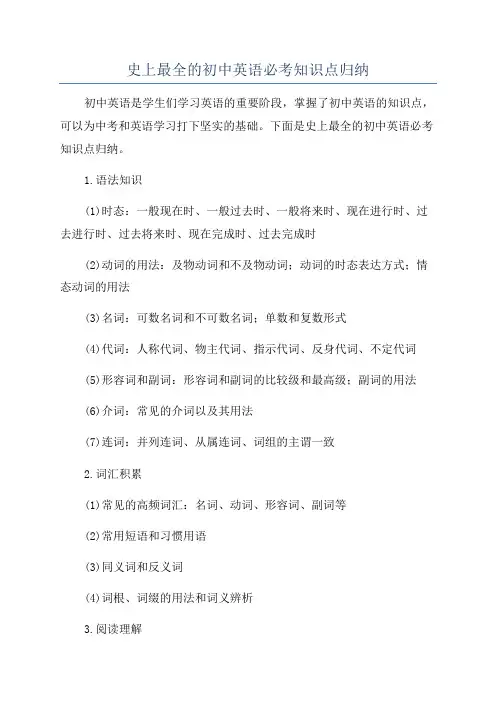
史上最全的初中英语必考知识点归纳初中英语是学生们学习英语的重要阶段,掌握了初中英语的知识点,可以为中考和英语学习打下坚实的基础。
下面是史上最全的初中英语必考知识点归纳。
1.语法知识(1)时态:一般现在时、一般过去时、一般将来时、现在进行时、过去进行时、过去将来时、现在完成时、过去完成时(2)动词的用法:及物动词和不及物动词;动词的时态表达方式;情态动词的用法(3)名词:可数名词和不可数名词;单数和复数形式(4)代词:人称代词、物主代词、指示代词、反身代词、不定代词(5)形容词和副词:形容词和副词的比较级和最高级;副词的用法(6)介词:常见的介词以及其用法(7)连词:并列连词、从属连词、词组的主谓一致2.词汇积累(1)常见的高频词汇:名词、动词、形容词、副词等(2)常用短语和习惯用语(3)同义词和反义词(4)词根、词缀的用法和词义辨析3.阅读理解(1)根据上下文和语境猜测词义(2)根据文章的主题和信息撰写简短的问题和答案(3)根据文章内容回答问题(4)根据文章内容判断正误(5)阅读短文并完成相关任务:填空、选择、排序等4.写作水平(1)书面表达:根据题目要求写作、描述、叙述、说明等(2)句型和语法:使用多种句型和语法结构进行表达(4)逻辑和连贯性:保证写作逻辑清晰、语句连贯5.口语交际和听力理解(1)听懂并理解日常生活对话和短文(2)正确运用英语进行口语交流:日常问候、询问、表达想法和意见、提出请求等(3)听力和口语训练:通过大量的听力练习和口语练习提高听说能力6.重点句型和常见句式(1)一般疑问句、特殊疑问句、选择疑问句(2)强调句(3)祈使句和感叹句(4)否定句和肯定句的转换(5)宾语从句和定语从句7.高频语法点(1) 动词的ing形式和ed形式(2)动词的时态和语态(3)形容词和副词的比较级和最高级(4)代词的用法和指代(5)介词的用法和固定搭配(6)主谓一致和主谓宾一致(7)各种从句的用法和连接词8.知名作家和文学作品(2)简要了解名著的故事情节和主要人物(3)了解一些名著的背景知识和相关文学常识9.文化常识(1)了解一些国家、民族、地区的文化习俗和特色(2)了解一些重要的历史事件和文化传统以上是初中英语必考知识点的归纳,希望能对你的学习有所帮助。
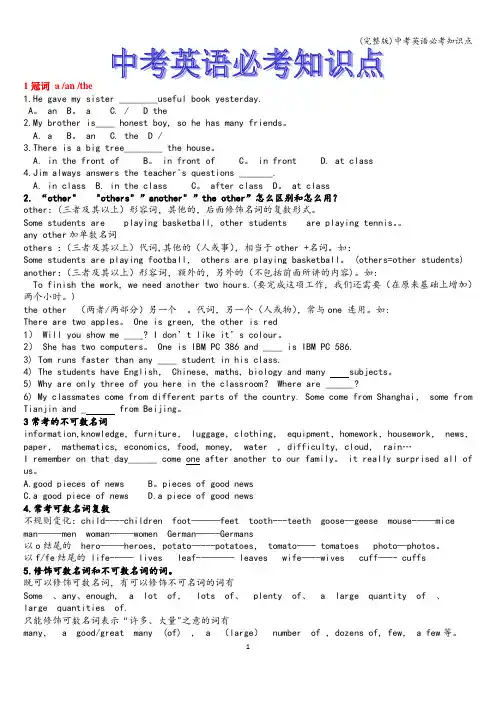
1冠词a /an /the1.He gave my sister ____useful book yesterday.A。
an B。
a C. / D the2.My brother is__ honest boy, so he has many friends。
A. a B。
an C. the D /3.There is a big tree____ the house。
A. in the front of B。
in front of C。
in front D. at class4.Jim always answers the teacher's questions _______.A. in classB. in the class C。
after class D。
at class2. “other""others" ”another" ”the other”怎么区别和怎么用?other:(三者及其以上)形容词,其他的,后面修饰名词的复数形式。
Some students are playing basketball, other students are playing tennis。
any other加单数名词others :(三者及其以上)代词,其他的(人或事),相当于other +名词。
如:Some students are playing football, others are playing basketball。
(others=other students) another:(三者及其以上)形容词,额外的,另外的(不包括前面所讲的内容)。
如:To finish the work, we need another two hours.(要完成这项工作,我们还需要(在原来基础上增加)两个小时。
)the other (两者/两部分)另一个。
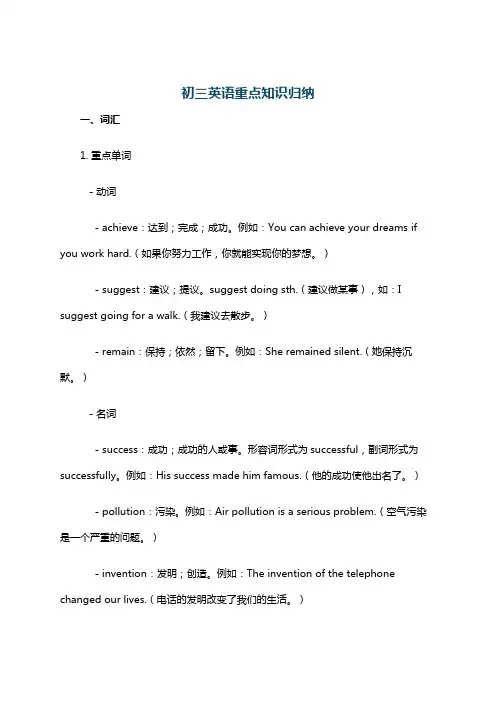
初三英语重点知识归纳一、词汇1. 重点单词- 动词- achieve:达到;完成;成功。
例如:You can achieve your dreams if you work hard.(如果你努力工作,你就能实现你的梦想。
)- suggest:建议;提议。
suggest doing sth.(建议做某事),如:I suggest going for a walk.(我建议去散步。
)- remain:保持;依然;留下。
例如:She remained silent.(她保持沉默。
)- 名词- success:成功;成功的人或事。
形容词形式为successful,副词形式为successfully。
例如:His success made him famous.(他的成功使他出名了。
) - pollution:污染。
例如:Air pollution is a serious problem.(空气污染是一个严重的问题。
)- invention:发明;创造。
例如:The invention of the telephone changed our lives.(电话的发明改变了我们的生活。
)- 形容词- confident:自信的;有信心的。
be confident of sth.(对某事有信心),如:He is confident of passing the exam.(他有信心通过考试。
) - dangerous:危险的。
名词形式为danger。
例如:It is dangerous to swim in this river.(在这条河里游泳是危险的。
)- active:积极的;活跃的。
例如:He is an active student in class.(他在课堂上是一个积极的学生。
)2. 词汇拓展- able(形容词,能够的) - ability(名词,能力) - enable(动词,使能够)。
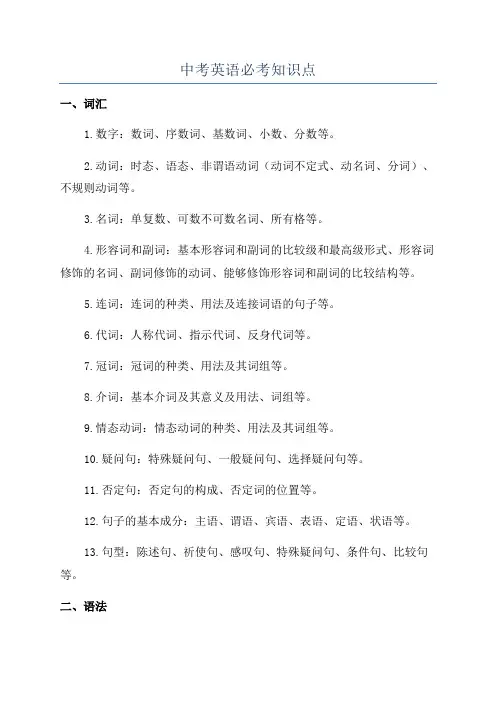
中考英语必考知识点一、词汇1.数字:数词、序数词、基数词、小数、分数等。
2.动词:时态、语态、非谓语动词(动词不定式、动名词、分词)、不规则动词等。
3.名词:单复数、可数不可数名词、所有格等。
4.形容词和副词:基本形容词和副词的比较级和最高级形式、形容词修饰的名词、副词修饰的动词、能够修饰形容词和副词的比较结构等。
5.连词:连词的种类、用法及连接词语的句子等。
6.代词:人称代词、指示代词、反身代词等。
7.冠词:冠词的种类、用法及其词组等。
8.介词:基本介词及其意义及用法、词组等。
9.情态动词:情态动词的种类、用法及其词组等。
10.疑问句:特殊疑问句、一般疑问句、选择疑问句等。
11.否定句:否定句的构成、否定词的位置等。
12.句子的基本成分:主语、谓语、宾语、表语、定语、状语等。
13.句型:陈述句、祈使句、感叹句、特殊疑问句、条件句、比较句等。
二、语法1.时态:一般现在时、一般过去时、一般将来时、现在进行时、过去进行时、将来进行时、现在完成时、过去完成时等。
2.语态:主动语态、被动语态。
3.非谓语动词:动词不定式、动名词、现在分词、过去分词的形式和用法。
4.名词性从句:主语从句、宾语从句、表语从句、同位语从句等。
5.定语从句:限制性定语从句、非限制性定语从句等。
6.状语从句:条件状语从句、时间状语从句、原因状语从句、方式状语从句、结果状语从句等。
7.并列句:并列句的连接及词组等。
8.书面表达:书信、应用文、记叙文、描写文、议论文、说明文等。
三、听力1.录音材料:记笔记、填空、选择等。
2.各种对话:日常交流、购物、问路、订酒店、预约、介绍、感叹等。
3.各种情景对话:图画、短文、故事等。
四、阅读理解4.夹叙夹议:根据短文内容综合归纳、评述、解释等。
五、写作1.书信:常见的书信格式、内容及写作要点等。
2.对话:场景对话、日常对话、情景对话等。
3.日记:时间、地点、人物、事件、感受等。

中考英语语法必考知识点大全
一、名词
1.名词的定义和分类
2.可数名词和不可数名词
3.数词和运用
4.名词所有格的表达
二、代词
1.人称代词的主格和宾格
2.物主代词的形式及其用法
3.反身代词的形式及其用法
4.不定代词的形式及其用法
三、形容词和副词
1.形容词的用法和比较等级
2.形容词性物主代词和名词性物主代词的区别
3.副词的分类和用法
4.副词的比较级和最高级
四、动词
1.动词的分类
2.动词的时态和语态
3.动词的不定式和动名词
4.动词的时态一致性和被动语态的转换
五、介词和介词短语
1.常见介词的用法
2.介词短语的位置及其修饰词的位置
六、连词和从句
1.并列连词和转折连词的用法
2.陈述句、祈使句和疑问句
3.陈述句的宾语从句和主语从句
4.特殊疑问句和宾补从句
七、时态和语态
1.一般现在时、一般过去时、一般将来时的构成和用法
2.现在进行时、过去进行时、将来进行时的构成和用法
3.现在完成时、过去完成时、将来完成时的构成和用法
4.一般现在时、一般过去时和一般将来时的被动语态的转换和用法
八、情态动词
1. can, could, may, might的用法
2. must, have to, need to的用法
3. should, ought to, shall的用法
4.情态动词在疑问句和否定句中的用法
九、固定搭配
1.动词与介词的固定搭配
2.形容词与副词的固定搭配
3.名词与介词的固定搭配
4.动词短语的固定搭配。
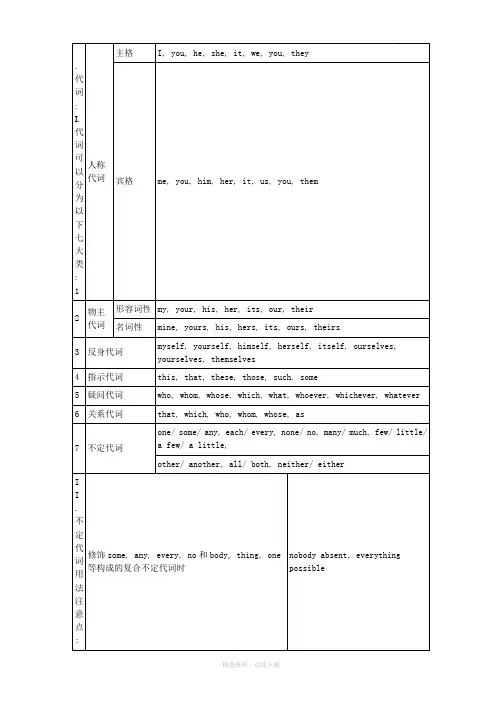
中考总复习英语必背知识归纳中考英语八种基本时态知识点1. 一般现在时概念: 表示经常发生的动作或经常存在的状态。
常和 always , often , usually , sometimes , every day 等表时间的状语连用。
如:1) I go to school every day . 我每天都去学校。
(表经常)2) He is always like that . 他总是那样。
(表状态)构成: 1) 主语+ be (am / are / is ) +……2) 主语 + 实义动词/三单动词+ …2.一般过去时概念: 1) 表示过去某个时间发生的动作或存在的状态.常和表示过去的时间状语连用. 如: yesterday , last week , in 1998 , twodays ago等.如: I went to a movie yesterday. 我昨天去看了一场电影.2) 也可表示过去经常或反复发生的动作.如: He always went to work by bike last week.构成: 1) 主语+ be (was / were ) +……2) 主语 + 实义动词过去式 +3. 现在进行时概念: 表示现在(说话瞬间)正在进行或发生的动作.如: He is singing.They are watching TV now.构成: 主语 + 助动词be(am/are/is) + 动词-ing形式构成.4. 过去进行时概念: 表示过去某一时刻或某一段时间正在进行的动作. 这一特定的过去时间除了有上下文暗示外,一般用时间状语来表示.如: 1) ---What were you doing?---I was jumping.2) ---What was the boy doing when the UFO arrived?---He was sleeping.构成: 主语 + 助动词be(was/were) + 动词-ing形式构成.5. 一般将来时概念: 表示将来某个时间要发生的动作或存在的状态,也表示将来经常或反复发生的动作,常与表示将来的时间状语连用,如: tomorrow, next week, next year, in the future等.如: He will go shopping tomorrow.They are going to play basketball next week.构成: 1) 主语 + 助动词will + 动原+…2) 主语 + be going to + 动原+ ….6. 过去将来时概念: 表示在过去将来的某一时间发生的动作或存在的状态.构成: 1) 主语(第一人称) + 助动词should + 动原+…2) 主语 + would + 动原+ ….3) 主语 + was/ were going to +动原…用法: 过去将来时除了上下文暗示外,一般常用在间接引语中,主句谓语动词为过去时态.如: 1) I should go.2) You knew I would come.3) They were going to Naning.7. 现在完成时构成: 主语 + 助动词 ( have / has ) + 动词过去分词+…用法例句表示过去发生或已经完成的动作对现在造成的影响或结果. ---Have you had your lunch yet?---Yes, I have. (现在我不饿了)8. 过去完成时构成: 主语 + 助动词 had + 动词过去分词+…用法例句表示过去在过去某一时间或动作之前已经发生或完成了的动作.它表示的动作发生的时间是”过去的过去”.表示过去某一时间可用by, before 等构成的短语,也可用when, before, 等引导的从句或者通过上下文表示.I had finished my homework when my mom came back home.中考英语宾语从句知识点宾语从句是指在一个句子中充当宾语的句子,如:He said that he wanted to be a teacher when he grew up.宾语从句的特点:①宾语从句有自己的连接词②宾语从句用陈述语序③宾语从句的时态(1)宾语从句的连接词:宾语从句的连接词包括that、if/whether(是否)、特殊疑问词。
中考英语知识点全汇总一、基础语法知识1.时态:一般现在时、一般过去时、一般将来时、现在进行时、过去进行时、将来进行时、过去完成时、现在完成时等。
2.动词时态、语态、非谓语动词:被动语态、情态动词、不定式、动名词、分词等。
3.名词:可数名词和不可数名词的用法、复数形式的变化等。
4.代词:人称代词、物主代词、反身代词、不定代词、指示代词等。
5.形容词:形容词的用法、形容词的最高级、比较级等。
6.副词:副词的用法、频率副词、程度副词等。
7.介词:介词的基本用法、介词短语等。
8.冠词:冠词的基本用法、定冠词和不定冠词的区别等。
二、句型结构1.简单句:主谓结构、主语从句等。
2.并列句:连接词的使用、表转折、表递进、表选择等。
3.复合句:定语从句、状语从句、宾语从句等。
三、阅读理解1.内容理解:根据文章的内容进行细节、主旨等方面的理解。
2.推理判断:根据文章提供的信息进行推测、推理等。
3.表达能力:根据文章的要求进行写作、归纳总结等。
四、口语表达1.询问:询问信息、询问意见等。
2.辩论:陈述自己的观点、提出理由等。
3.请求:请求帮助、请求许可等。
4.提醒:提醒他人注意事项、提醒日程安排等。
5.道歉:道歉表达、解释原因等。
五、写作技巧1.写作表达:书信写作、日记写作、演讲稿写作等。
2.句子表达:句子的连贯性、句子的多样性等。
3.表达方式:使用形容词、副词、比喻、排比等方式进行表达。
4.逻辑结构:文章段落的开头、结尾、过渡等。
六、听力技巧1.理解题目:理解题干的意思、答题要求等。
2.抓关键词:抓住关键词帮助理解听力材料。
3.预测猜测:根据题干的提示预测可能听到的内容。
4.注意视听:注意听力材料中的重要信息、时间、地点等。
七、词语运用1.同义词、反义词的辨析。
2.词组的搭配。
3.词义的辨析。
八、语篇搭配1.对话:问答形式、交际用语等。
中考英语 100 个必考知识点一.单选A.冠词:(1)a/an 的区分:注意以“U”开头的单词。
如果发字母u 本身的音/ju:/,前面加a: a useful book, a university, a usual chair;如果发以外的音,前面加an:an unusual chair, an unimportant meeting, an unforgetable experience(2)球类运动和三餐饭前不加theplay football ,play table tennis 乐器前加theplay the violin,play the piano(3)a—一个,the—那个(4)高难度竞赛题a“u”;an“h”;an “s”;an “x”用汉语拼音给字母注音,如有声母,就用a,如U—you;如没有声母,就用an,如H—ei qi,S—ai si,X—ai ke siC.连词(1)连词现象:Although ,though 与but 通常不连用because 与so 不连用if (如果)与then 不连用(2)就近一致连词neither...nor , either...or ,not only...but also not...but...(3)连接句子与to do 形式because +句子(有完整主谓结构)because of +介词宾语(名词等)in order to do (in order not to do ) in order that +句子so as to so as that +句子so...that +句子too...to do enough to do so good a book that +句子such a good book that+句子so good that+句子(4)重要联词的应用unless(=if not)除非or 否则(威胁,劝告)as if / as though (仿佛)even if / even though (即使)not...until (直到...才)D.介词(1)介词+doing 介词+ 代词宾格形式Neither of us is late.The book is for you. The knife is used for cutting things.Tom is sitting between him and me.(禁用“I”)关联记忆:介意Mind + doingWould you mind my smoking here?(2)on in at 的用法:表时间:on(天优先,只要涉及天的概念就用on);in(时段);at (时刻)on the morning of April 1st. on a rainy night 在一个雨天的夜晚at the same time(3)表伴随:with / without ,或doing She is a girl with long hair.She is a girl wearing a new dress.(4)表方式:by bike,on foot 没有冠词“a”或名词复数What time is it by your watch? The boss pays us by week.He beat her with a book.(with 后要带a 或复数)speak in English Write in ink(5)介词(不加the)+名词at table 在桌旁,且在吃饭(两层意思)at the table 在桌旁,具体干什么不清楚at school in the schoolE.名词(1)单复数特殊变化:男、女、脚foot-feet、牙、鹅goose-geese、孩子people (可数名词),sheep, deer(鹿)单复数同形中、日不变;英、法a-e; 美、德该死(加S)Amercians,Germans(2)名词的复数重心转移:This is an old pair of shoes. I want a new pair .(3)带性别的复合词组:women(变)doctors(变)bus lines(只变最后一词)F.动词(1)动词变化三大黄金法则:主谓一致,就近一致,双动词关系主谓一致:谓语动词跟着主语发生变化第三人称单数现象(集体名词做主语)Our class are playing football now (与人有关的动作)Our class is a small one (整体)主谓一致之就近一致(必考):There be 句型Either or Neither...nor...not only...but also.. Not only they but also I am wrong.时态一致:从句与主句时态一致He said he had been there for an hour.He said the sun is bigger than the moon.(自然规律自然现象用一般现在时态) He said the moon is running around the earth.(错误,应改为一般现在时态) 时态一致之时态变异(必考):A——瞬间动词的-ing 形式表将来The plane is taking off in an hour. The old man is dying.(将要死了)B——条件状语从句:一般现在时表将来I don't know if he will come tomorrow. If he comes, I will call you.I will ring you as soon as I finish my work.I won’t go out until my homework is done.典型考题:A—I will go swimming. B—If you go, so will I.双动词关系:单句中,若有两个动词(be 动词,行为动词,不包括助动词),他们的关系有四种:and 连接——动作先后或并列发生,前后形式一致改为to do——动作未做,准备做改为doing——动作正在做或已做改为-ed 形式——后一动作被动发生特例:* 使、让(make ,let,have)主动不带to,被动带tomake sb. do /make sb not do/be made to do let sb. do*The teacher asked the students to stop talking and to listen to her.*I have my carrepaired.(我请人修理了我的车。
中考英语知识点归纳2024一、词汇。
1. 重点单词。
- 动词。
- be动词(am/is/are/was/were)- 用法:用于表示人或事物的状态、性质等。
例如:I am a student.(一般现在时)He was at home yesterday.(一般过去时)- 实义动词。
- 及物动词(vt.):如like,后面直接跟宾语。
I like English.- 不及物动词(vi.):如run,不能直接跟宾语。
He runs fast.- 名词。
- 可数名词:有单复数形式。
如book - books,规则变化包括加 - s (books)、加 - es(boxes)等,还有不规则变化,如man - men,child - children等。
- 不可数名词:如water,milk等,没有复数形式,作主语时谓语动词用单数形式。
- 形容词和副词。
- 形容词:用于修饰名词,说明事物的特征。
例如:a beautiful flower。
形容词有原级、比较级(一般加 - er或more + 形容词原级,如taller,more beautiful)和最高级(加 - est或most+形容词原级,如tallest,most beautiful)的变化。
- 副词:用于修饰动词、形容词或其他副词。
例如:He runs quickly. 副词的比较级和最高级变化规则与形容词相似。
2. 词汇拓展。
- 前缀:如un -(unhappy,unlucky)表示否定;re -(reuse,rewrite)表示“再,重新”。
- 后缀:- er(worker,teacher)表示人;- ful(careful,helpful)表示“充满……的”。
3. 固定搭配。
- 动词短语。
- look forward to(期待),后面接名词或动名词。
I'm looking forward to your reply.- pay attention to(注意),同样接名词或动名词。
中考所有英语知识点归纳一、单词拼写1. 名词复数形式的构成规则,如box—boxes2. 形容词比较级与最高级的构成规则,如big—bigger—biggest3. 动词的过去式与过去分词的构成规则,如go—went—gone4. 动词第三人称单数形式的构成规则,如watch—watches5. 动词-ing形式的构成规则,如swim—swimming6. 词根词缀法拼写单词,如telephone, impossible二、时态1. 一般现在时、现在进行时、一般过去时、过去进行时、一般将来时、现在完成时的构成和用法2. 过去将来时、过去完成时的用法三、名词1. 可数与不可数名词2. 计量名词的用法3. 名词所有格的构成规则,如Tom的书4. 名词的单复数变化规则四、代词1. 人称代词的主格和宾格形式2. 物主代词的形式和用法,如mine, yours3. 反身代词的形式和用法,如myself, yourself4. 不定代词的形式和用法,如some, any, every, each, both, either, neither五、形容词和副词1. 形容词的位置和用法,如a big house, a nice girl2. 比较级和最高级的构成和用法,如taller, the tallest3. 副词的用法,如slowly, fast六、动词1. 不规则动词的变化规则,如go—went—gone2. 动词的短语形式,如look after, take off3. 动词不定式的形式和用法,如to go, go shopping4. 动词的时态和语态变化,如is going to do, was done5. 动名词的构成和用法,如swimming, enjoy swimming七、时态和语态1. 一般现在时、一般过去时、一般将来时、现在进行时、过去进行时、过去将来时、现在完成时、过去完成时的构成和用法2. 被动语态的构成和用法,如The book is written by Tom.3. 完成时态与被动语态的综合运用八、介词1. 常用介词的用法,如in, on, at2. 特殊介词的用法,如into, through, between九、连词1. 并列连词的用法,如and, but, or2. 引导从句的连词,如when, if, because十、冠词1. 定冠词和不定冠词的用法,如a book, an apple, the sun2. 特指某人某物的用法,如the girl, the car3. 不用冠词的情况,如go to school, at home十一、句式1. 肯定句、否定句、一般疑问句、特殊疑问句的基本结构和用法2. 直接引语和间接引语的转换,如He said, "I am happy." → He said that he was happy.3. 各种句式在实际交际中的综合运用以上是中考英语知识点的一个大致归纳,希望对你有所帮助。
中考英语知识点归纳汇总-详细第一课时名词一、概述1、名词的属性:表示人或事物的名称抽象概念的词叫名词。
2、名词分普通名词和专有名词。
普通名词是表示某一类人或事物,或某种物体或抽象概念的名称。
如:teacher, desks, plates, milk, box等,专有名词表示某一特定的人、事物、地方团体、党派、国家机关、语言、节日等专用的名称。
(运用)如:China, Chinese, Saturday, June, Green, Beijing, Olympic等。
(专有名词的第一个字母要大写)二、可数名词与不可数名词1、可数名词是指表示人或事物,可以用数来计量的名词,有单复数之分。
如:glass-----glasses; book---- books2、不可数名词是指所表示的事物不能用数来计量。
如:paper, rice, water , milk, tea等。
3、有些名词在特定情况下由不可数变为可数名词。
Light travels faster than sound; (light:光线,不可数)The lights are on. (light:灯,可数)4、不可数名词的量的表示不可数名词一般无法用数来计算,前面不能用a或an或数词来表示数量,它的量往往借助于容器来表示。
如:a glass of milk ------ four glasses of milka piece of paper------two pieces of papera bag of rice------three bags of rice三、可数名词的复数形式(识记、运用)1、可数名词在应用时有单复数之分,单数变复数有规则变化和不规则变化两种。
规则变化情况变化形式例词一般情况加-sgirls; books;以s,x,ch,sh结尾的名词加-esclasses; boxes; watches;brushes以辅音字母加y结尾的名词变y为i, 加escity---cities; baby---babies以f或fe结尾的名词变f,fe为v, 加esknife---knives; leaf---leaves以O结尾的名词potatoes; tomatoes;photos; kilos; bamboos; radios 2、少数名词有不规则的变化形式policeman---policemen; man---men; woman---women; tooth---teeth; foot---feet; sheep---sheep; deer---deer; Japanese--- Japanese; Chinese --- Chinese; fish --- fish 四、名词所有格(运用)名词的所有格是表示所有关系的形式,它也有构成上的变化。
史上最全的中考英语必考知识点大全初一年级(上)【考点扫描】中考考点在本单元主要集中在:1. 动词be的用法;2. 人称代词和物主代词的用法;3. 名词的单复数和所有格的用法;4. 冠词的基本用法;5. There be句型的用法。
6. 本单元学过的词汇、短语和句型;7. 本单元学过的日常交际用语。
考试形式可以是单项填空、完型填空、短文填空、完成句子。
初一年级(上)【知识梳理】I. 重点短语1. Sit down2. on duty3. in English4. have a seat5. at home6. look like7. look at8. have a look9. come on10. at work11. at school12. put on13. look after14. get up15. go shoppingII. 重要句型1. help sb. do sth.2. What about…?3. Let’s do sth.4. It’s time to do sth.5. It’s time for …6. What’s…? It is…/ It’s…7. Where is…? It’s….8. How old are you? I’m….9. What class are you in?I’m in….10. Welcome to….11. What’s …plus…? It’s….12. I think…13. Who’s this? This is….14. What can you see? I can see…. 15. There is (are) ….16. What colour is it (are they)?It’s (They’re)…17. Whose …is this? It’s….18. What time is it? It’s….III. 交际用语1. Good morning, Mis s/Mr….2. Hello! Hi!3. Nice to meet you. Nice tomeet you, too.4. How are you? I’m fine, thank you/thanks. And you?5. See you. See you later.6. Thank you! You’re welcome.7. Goodbye! Bye!8. What’s your name? My name is ….9. Here you are. This way, please.10. Who’s on duty today?11. Let’s do.12. Let me see.IV. 重要语法1. 动词be的用法;2. 人称代词和物主代词的用法;3. 名词的单复数和所有格的用法;4. 冠词的基本用法;5. There be句型的用法。
【名师讲解】1.in/on在表示空间位置时,in表示在某个空间的范围以内,on表示在某一个物体的表面之上。
例如:There is a bird in the tree. 树上有只鸟。
There is a picture onthe wall. 墙上有张图。
2. this/that/these/those(1)this常常用来指在时间、地点上更接近讲话人的人和事,these是this的复数形式。
that常常用来指在时间、地点上离讲话人更远一点的人和事,those时that的复数形式。
例如:You look in this box and I’ll look in that one over there.你看看这个盒子,我去看那边的那个盒子。
I want this car, not that car. 我想要这辆小汽车,不是那一辆。
Take these books to his room, please. 请把这些书拿到他房间去。
This is mine; that’s yours. 这个是我的,那个是你的。
These are apples; those are oranges. 这些是苹果,那些是橘子。
(2)在打电话的用语中,this常常指的是我,that常常指的是对方。
例如:This is Mary speaking. Who’s that? 我是玛丽。
你是谁?3. There be/ haveThere be "有",其确切含意为"某处或某时存在某人或某物。
"其结构是:There be + 某人或某物 + 表示地点或时间的状语。
There be 后面的名词实际上是主语,be 动词的形式要和主语在数上保持一致,be动词后面的名词是单数或不可数名词时用is,名词是复数时用are。
例如:(1) There is a big bottle of coke on the table. 桌上有一大瓶子可乐。
(2) There is a doll in the box. 那个盒子里有个娃娃。
(3) There are many apples on the tree. 那树上有许多苹果。
总之,There be结构强调的是一种客观存在的"有"。
have表示"拥有,占有,具有",即:某人有某物(sb. have / has sth.)。
主语一般是名词或代词,与主语是所属关系。
例如:(4) I have two brothers and one sister.我有两个兄弟,一个姐姐。
(5) That house has four rooms.那所房子有四个房间。
4. look/ see/ watch(1)look 表示“看、瞧”,着重指认真看,强调看的动作,表示有意识地注意看,但不一定看到,以提醒对方注意。
,如:Look! The children are playing computer games. 瞧!孩子们在玩电脑游戏。
Look! What’s that over there? 看!那边那个是什么?单独使用是不及物动词,如强调看某人/物,其后接介词at,才能带宾语,如:He’s looking at me。
他正在看着我。
(2)see强调“看”的结果,着重的是look这个动作的结果,意思是“看到”,see是及物动词,后面能直接跟宾语。
如:What can you see in the picture? 你能在图上看到什么?Look at the blackboard. What did you see on it?看黑板!你看到了什么?(3)watch“观看,注视”,侧重于场面,表示全神贯注地观看、观察或注视某事务的活动,强调过程,常用于“看电视、看足球、看演出”等。
如:Yesterday we watched a football match on TV.昨天我们从电视上看了一场足球比赛。
4. put on/ / input on意为“穿上,戴上”。
主要指“穿上”这一动作, 后面接表示服装、鞋帽的名词。
in 是介词,表示“穿着”强调状态。
在句中可以做定语、标语和状语。
如:It’s cold outside, put on your coat. 外面冷,穿上你的外衣。
He puts on his hat and goes out. 他戴上帽子,走了出去。
The woman in a white blouse is John’s mother.穿白色衬衣的那个妇女是John的妈妈。
5. house/ home/familyhouse :“房子”,指居住的建筑物; Home: “家”,指一个人同家人共同经常居住的地方; Family: “家庭“,“家庭成员”。
例如:Please come tomy house this afternoon. 今天下午请到我家来。
He is not at home. 他不在家。
My family all get up early. 我们全家都起得很早。
6. fine, nice, good, well四者都可用作形容词表示"好"之意,但前三者既可作表语又可作定语,而后者仅用作表语。
主要区别在于:(1) fine指物时表示的是质量上的"精细",形容人时表示的是"身体健康",也可以用来指"天气晴朗"。
例如:Your parents are very fine. 你父母身体很健康。
That's a fine machine.那是一台很好的机器It's a fine day for a walktoday.今天是散步的好时候。
(2)nice主要侧重于人或物的外表,有"美好","漂亮"的意思,也可用于问候或赞扬别人。
例如:Lucy looks nice. 露西看上去很漂亮。
These coats are very nice.那些裙子很好看。
Nice to meet you. 见到你很高兴。
It's very nice of you. 你真好。
(3)good形容人时指"品德好",形容物时指"质量好",是表示人或物各方面都好的普通用语。
例如:Her son is a good student. 她儿子是一个好学生。
The red car is very good. 那辆红色小汽车很好。
(4)well只可用来形容人的"身体好",但不能作定语,它也能用作副词作状语,多放在所修饰的动词之后。
例如:I'm very well, thanks. 我身体很好,谢谢。
My friends sing well. 我的朋友们歌唱得好。
中考考点在本单元主要集中在:1. 动词be的用法;2. 人称代词和物主代词的用法;3. 名词的单复数和所有格的用法;4. 冠词的基本用法;5. There be句型的用法。
6. 本单元学过的词汇、短语和句型;7. 本单元学过的日常交际用语。
考试形式可以是单项填空、完型填空、短文填空、完成句子。
初一年级(下)【知识梳理】I. 重点短语1. a bottle of2. a little3. a lot (of)4. all day5. be from6. be over7. come back8. come from9. do one’s homework10. do the shopping11. get down12. get home13. get to14. get up15. go shopping16. have a drink of17. have a look18. have breakfast19. have lunch20. have supper21. listen to22. not…at all23. put…away24. take off 25. throw it like that26. would like27. in the middle of the day28. in the morning / afternoon/ evening29. on a farm30. in a factoryII. 重要句型1. Let sb. do sth.2. Could sb. do sth.?3. would like sth.4. would like to do sth.5. What about something to eat?6. How do you spell …?7. May I borrow…?III. 交际用语1. —Thanks very much!—You're welcome.2. Put it/them away.3. What's wrong?4. I think so. I don't thinkso.5. I want to take some books to the classroom.6. Give me a bottle of orange juice, please.Please give it / them back tomorrow. OK.9. What's your favourite sport?10. Don't worry.11.I’m (not) good at basketball.12. Do you want a go?13. That's right./ That‘s all right./ All right.14. Do you have a dictionary /any dictionaries?Yes, I do. / No, I don’t.15. We / They have some CDs.We / They do n’t have any CDs.16. ---What day is it today / tomorrow?---It’s Monday.17. ---May I borrow your colour pens, please?---Certainly. Here you are.18. ---Where are you from?---From Beijing.19. What's your telephone number in New York? 20. ---Do you like hot dogs?---Yes, I do. ( A little. / Alot. / Very much.)---No, I don't. ( I don't likethem at all.)21. ---What does your mother like?---She likes dumplings and vegetables very much.22. ---When do you go to school every day?---I go to school at 7:00 every day.23. ---What time does he go to bed in the evening?---He goes to bed at 10:00.IV. 重要语法1.人称代词的用法;2. 祈使句;3. 现在进行时的构成和用法;4.动词have的用法;5.一般现在时构成和用法;6.可数名词和不可数名词的构成和用法【名师讲解】1. That's right./ That‘s all right./ All right.That’s right意为“对的”,表示赞同对方的意见、看法或行为,肯定对方的答案或判断。